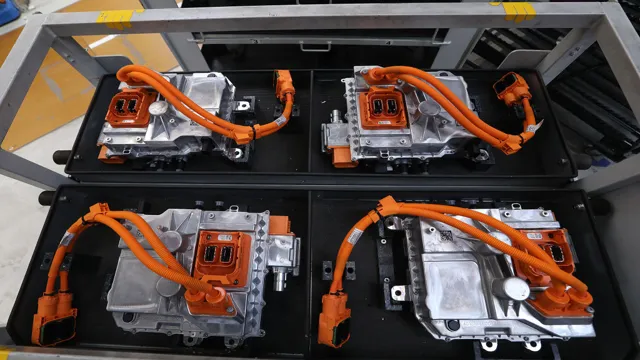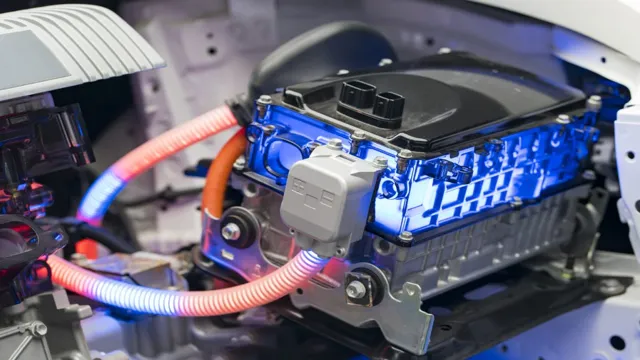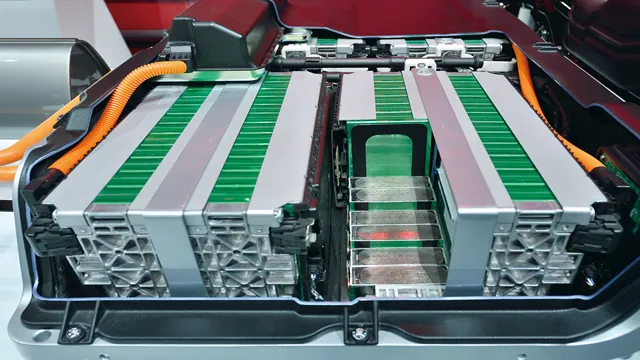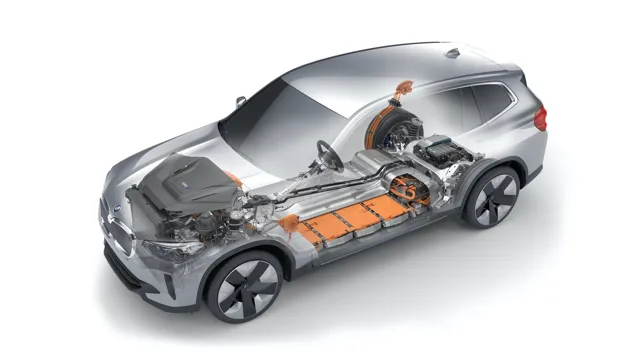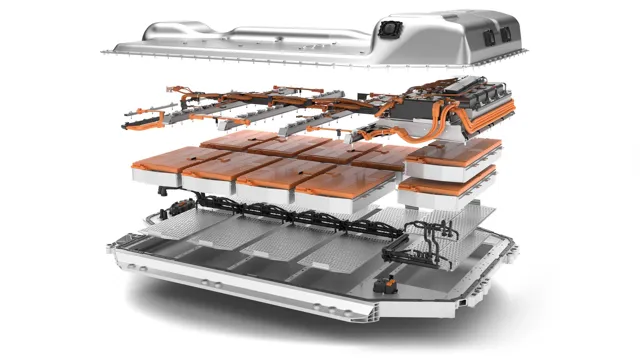Revolutionizing the Automotive World: The Growing Electric Car Battery Industry
The electric car battery industry has taken center stage in recent years as the world shifts towards environmentally friendly modes of transportation. With the rise of electric vehicles, the demand for high-performance and long-lasting batteries has never been greater. The market for electric car batteries is expected to grow exponentially over the next decade, with projections suggesting that it could surpass $85 billion by 202
But what is driving this growth? Is it merely a passing trend or does it represent a significant shift in the automotive industry? The answer lies in the technology behind these batteries and their potential to revolutionize the way we think about transportation. Electric car batteries are capable of powering vehicles with zero emissions, reducing our reliance on fossil fuels and contributing to a healthier planet. However, the industry still faces significant challenges, such as the high cost of production and concerns about the environmental impact of mining the materials needed for these batteries.
As companies race to develop more efficient and affordable batteries, the electric car battery industry remains a dynamic and ever-evolving field. So what does the future hold for electric car batteries? Will they become the norm for all vehicles on the road, or will they continue to be a niche market? Join us as we explore the fascinating world of electric car batteries, their potential for driving sustainability, and their impact on the automotive industry as a whole.
Market Overview
The electric car battery industry has witnessed significant growth in recent years, driven by the increasing demand for electric vehicles (EVs) in the market. The adoption of EVs is supported by various policies and incentives by governments to reduce greenhouse gas emissions and enhance energy security. The cost of battery production has also decreased, making EVs more affordable to the masses.
Advancements in technology and research have led to higher capacity and longer life span of batteries, addressing concerns about range anxiety and durability. However, the industry is still facing challenges such as the availability of raw materials and the environmental impacts of battery disposal. Nevertheless, the prospects of the electric car battery industry remain promising, with projections of further growth and expansion in the near future.
Global battery market expected to reach $135.88 billion by 2027 (Fortune Business Insights)
The global battery market is expected to grow exponentially over the next few years, reaching an estimated value of $1388 billion by 202 This is a significant increase from the estimated value of $7
03 billion in 201 The growth of the battery market can be attributed to the increasing demand for batteries in various industries, including automotive, consumer electronics, and renewable energy. Additionally, the rise in demand for electric vehicles and the need for energy storage solutions are also expected to boost the growth of the battery market.
As technology develops, manufacturers are focusing on developing batteries that can store more energy while maintaining a longer lifespan. This is essential for the growing renewable energy sector, where large-scale energy storage systems are needed to balance supply and demand. As a result, lithium-ion batteries are expected to dominate the market due to their ability to provide high energy density and power efficiency.
With the increasing demand for batteries, the market is also expected to witness an influx of new players, intensifying the competition and spurring innovation.
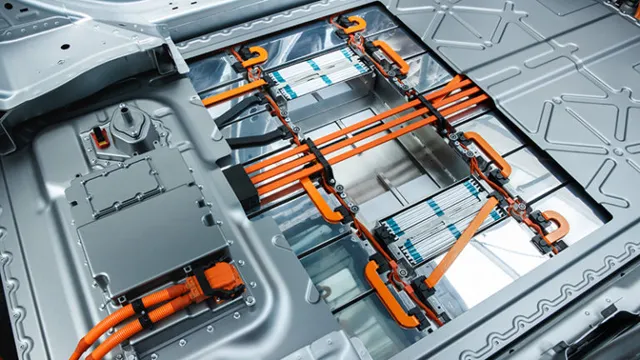
Electric vehicle battery market expected to grow at a CAGR of over 18% from 2020-2027 (Mordor Intelligence)
The electric vehicle battery market has been experiencing remarkable growth over the last few years, and it is expected to continue in that direction in the next few years. According to Mordor Intelligence’s report, the market is likely to see a Compound Annual Growth Rate (CAGR) of over 18% from 2020 to 202 This growth can be attributed to the increasing demand for electric vehicles globally, with governments and NGOs advocating for eco-friendly practices.
Companies are focusing on developing batteries with better performance, increased energy density, and longer battery life to meet the demands of electric vehicle customers. The market’s impressive growth highlights the potential for the adoption of electric vehicles worldwide. The global electric vehicle battery market is expected to increase as automakers and suppliers invest heavily to increase production capacities and develop new and improved battery technologies.
This trend will, in turn, boost the global and local economies, generating job opportunities, tax revenue, and foreign investment. The shift towards electric vehicles is not only positive for the environment but also for society as it reduces oil dependency and air pollution.
Key Players in the Industry
The electric car battery industry has seen significant growth in recent years, and key players have emerged as leaders in developing innovative solutions. Tesla, for instance, has been at the forefront of developing electric car batteries that go beyond the traditional lithium-ion technology. Their recent introduction of the 4680 battery has created a buzz in the industry, with its promising energy density and cost savings.
Another notable player is LG Chem, the South Korean company that supplies batteries to many major automakers. They have pioneered the use of nickel-cobalt-manganese (NCM) battery chemistry, which has been used in many electric vehicles. Chinese company CATL is also making strides in the industry, with a focus on developing batteries with longer lifespans and faster charging times.
As the demand for electric cars continues to rise, these key players will play a crucial role in shaping the future of the industry and pushing the boundaries of what is possible.
Tesla: leading electric car battery manufacturer
When it comes to electric car battery manufacturing, Tesla is often recognized as one of the key players in the industry. Over the years, Tesla has invested a significant amount of time and resources in their lithium-ion battery supply chain, resulting in a high-quality and efficient battery system. With their Gigafactory in Nevada, Tesla has been able to create a vertically integrated manufacturing process, allowing them to produce battery cells and packs in-house.
This has helped them to keep costs low and scale their production quickly. In addition to their manufacturing capabilities, Tesla’s battery technology also sets them apart from their competitors. Their batteries have a high energy density, which allows for longer travel distances on a single charge.
As the electric car market continues to grow, it’s clear that Tesla will remain a key player in the industry and continue to drive innovation in battery technology.
LG Chem: producing batteries for electric vehicles from major manufacturers like GM and Hyundai
LG Chem is a major player in the electric vehicle battery industry, producing batteries for leading automakers such as General Motors and Hyundai. Their batteries are known for their high energy density and long-range capabilities, making them a popular choice among electric vehicle manufacturers. LG Chem offers a wide range of battery options, from small packs for hybrid vehicles to large packs for long-range electric vehicles.
Their batteries are also designed to be environmentally friendly, using fewer hazardous materials and recycling processes. The global demand for electric vehicles is increasing, and LG Chem is well-positioned to meet this demand in an efficient and sustainable way. So if you’re looking to purchase an electric vehicle, chances are its battery might have been supplied by LG Chem!
BYD: top electric vehicle battery producer in China
When it comes to electric vehicle battery production, one company stands out in China: BYD. Founded in Shenzhen in 2003, BYD has become a major player in the industry and is now ranked as the top electric vehicle battery producer in China. They produce a range of batteries, including lithium-ion, blade, and iron-phosphate batteries, which are used in various electric vehicle models.
BYD has partnerships with several car manufacturers, including Toyota and Volkswagen, and has even begun producing their electric vehicles as well. With a strong focus on innovation and sustainability, BYD is helping to drive the shift towards electric vehicles and renewable energy in China and beyond.
Challenges and Opportunities
The electric car battery industry is facing both challenges and opportunities as it continues to grow and evolve. One major challenge is the high cost of producing batteries, which makes electric cars more expensive to manufacture and purchase. However, as technology improves and demand increases, economies of scale could help bring down these costs in the future.
Additionally, the industry has the potential to create new jobs and spur innovation in the renewable energy sector. Another opportunity lies in improving battery efficiency and range, which could make electric cars more competitive with traditional gas-powered vehicles. Overall, while there are certainly hurdles to overcome, the electric car battery industry is positioned to play an important role in the transition to a more sustainable future.
Challenges include high costs and limited range of electric vehicle batteries
Electric vehicle (EV) technology has come a long way, but challenges still remain. One of the biggest challenges is the high cost of EV batteries. While prices have come down over the years, they are still expensive, which makes EVs less accessible to many consumers.
Additionally, the range of EV batteries is limited, which can present a challenge for drivers who need to travel long distances. However, there are also opportunities in the EV market, especially as technology continues to improve and prices come down. For instance, new battery designs and materials are being developed that could significantly improve the range of EVs while reducing their cost.
Moreover, governments and private companies are investing heavily in charging infrastructure, which will make it easier for drivers to access charging stations and reduce range anxiety. As the EV market continues to evolve, it is likely that we will see more and more innovative solutions to these challenges.
Opportunities include increasing demand and advancements in technology
When it comes to the challenges and opportunities in the tech industry, there are certainly plenty of both to go around. On the one hand, there are complex issues like data privacy and cybersecurity that must be addressed if we are to continue advancing as a society. At the same time, however, there are also countless opportunities emerging every day, from the increasing demand for tech-savvy professionals to the continuous stream of new and exciting advancements in technology.
One of the key factors driving this growth is the sheer versatility of the industry – there are so many different niche areas and specialties within tech that there is always something new to explore and learn. As an AI language model, I can’t have personal experiences or feelings, but it’s hard not to be struck by just how much potential there is within the tech field. Jobs in tech are some of the most in-demand roles across the globe, and the widening skills gap is only making them more valuable.
This is especially true in light of recent events, which have forced businesses to shift their operations online and become more digitally oriented in order to stay afloat. All of this demand is driving innovation, too – companies are pouring vast resources into developing new technologies and products, which are in turn helping to push the industry forward. Of course, with all of this growth comes a few challenges as well.
The rapid pace of advancement can be hard to keep up with for those who aren’t well-versed in tech, and there is always the looming threat of security breaches and data theft to contend with as well. But these aren’t insurmountable issues – with the right resources, training, and expertise, it is possible to stay ahead of the curve, anticipate trends, and respond to challenges as they arise. Overall, then, the opportunities within the tech industry far outweigh the challenges, making it an exciting and dynamic space to be a part of for anyone who is passionate about the future of innovation.
Future Outlook
The electric car battery industry is undoubtedly one of the most exciting and innovative industries of our time, and it is only getting bigger and better as we move forward. With the rapid advancements of battery technology, we can expect to see electric cars becoming more user-friendly, affordable, and environmentally friendly than ever before. In fact, the electric car battery industry is projected to grow at a staggering rate in the coming years, with experts predicting that global EV battery sales will surpass $60 billion by 202
This exponential growth can largely be attributed to the increasing demand for green vehicles and renewable energy sources as people are becoming more environmentally aware and conscious. Additionally, the development of new battery chemistries and technologies promises to drive down the prices of EV batteries, making them more accessible to the masses. This will lead to a greater adoption of electric cars as more people realize the economic and social benefits of driving electric.
Furthermore, as we continue to explore and innovate in this field, the future possibilities seem endless. Imagine a world where electric cars can travel further, charge faster, and provide a seamless driving experience. The electric car battery industry has the potential to revolutionize not only the automotive industry but also the entire energy sector, paving the way for more sustainable and green energy solutions.
In conclusion, the electric car battery industry is an ever-evolving and exciting industry that holds great promise for the future of transportation and energy sustainability. With the ongoing advancements in battery technology and the increasing demand for green vehicles, we can expect to see a dramatic shift towards electric cars in the coming years, leading to a cleaner and greener world for future generations.
Government regulations, advancements in technology and increasing consumer demand are expected to drive growth
As the world continues to progress, there is an increasing demand for environmentally sustainable products. This demand is not only coming from consumers, but also from governments who are enacting strict regulations to ensure that businesses are doing their part to reduce their impact on the environment. Technology is also playing a major role in this shift, with new innovations allowing for more efficient and eco-friendly production methods.
As a result, businesses that prioritize sustainability are poised to thrive in the coming years. Whether it’s through the use of renewable energy sources, or the adoption of closed-loop production systems, there are countless ways that companies can reduce their environmental impact. By investing in these initiatives, companies can meet the demands of both regulators and consumers, while also setting themselves apart from their competitors.
So, if you’re a business owner looking to stay ahead of the curve, now is the time to start thinking about ways to reduce your ecological footprint and embrace sustainability as a core value.
Conclusion
In the world of automobiles, electric cars are definitely the way of the future. With their eco-friendly approach and zero-emission capability, they have captivated the hearts of consumers and policymakers alike. The electric car battery industry, therefore, has a critical role to play in ensuring the success and scalability of this technological transition.
From improving battery life and energy density to minimizing production costs and environmental impact, the industry can leverage its research and development prowess to unlock new opportunities and solutions for a sustainable future. So, whether you’re a fan of Tesla, Nissan or Chevy, there’s no denying the fact that the electric car battery industry is poised to charge ahead and revolutionize how we drive and power our world.”
FAQs
What is the current market size of the electric car battery industry?
The global electric car battery industry was valued at $27.6 billion in 2019 and is expected to reach $94.4 billion by 2027.
Which companies are leading the electric car battery industry?
Currently, the top players in the electric car battery industry are Tesla, Panasonic, BYD, LG Chem, and CATL.
What are some of the advancements in electric car batteries?
Some key advancements in the electric car battery industry include the development of solid-state batteries, higher energy density batteries, and improved charging infrastructure.
How is the electric car battery industry impacting the environment?
While electric cars produce no tailpipe emissions, there are concerns about the environmental impact of battery production and disposal. Efforts are being made to improve battery recycling and reduce the use of unsustainable materials in battery production.
